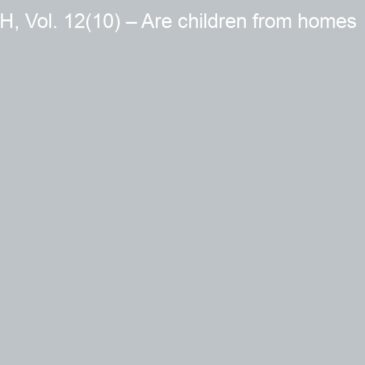Domestic violence comes in many forms, including physical and emotional abuse, financial control, social control, and more. It affects not only the abused, but also their friends and family. Children exposed to domestic violence can experience emotional and psychological consequences including anxiety, depression, and substance use. This week, as part of our Special Series on Addiction and Domestic Violence, STASH reviews a longitudinal study by Scott Menard and colleagues that explored the effects of adolescents’ exposure to violence either, themselves or their parents, on drug use as an adult.
What is the research question?
What role does exposure to violence in adolescence play in adult illicit drug use?
What did the researchers do?
The researchers analysed data from the nationally representative 27-year long National Youth Survey Family Study (NYSFS). At baseline, 1,725 youth (73% of those recruited) agreed to participate and 70% of the initial respondents completed the final wave. Participants completed their first assessment when they were between the ages of 11 and 17 and their last between the ages of 39 and 45. The researchers used logistic regression to examine how experiences of abuse in adolescence predicted future drug use.
What did they find?
As Table 1 shows, women who reported consistently witnessing parental violence as teens were nearly 2.5 times more likely to report using hard drugs (e.g., cocaine, hallucinogen, heroin) as adults, and over two times more likely to report using marijuana as adults, compared to women who did not report witnessing parental violence. However, this relationship did not hold among men. Surprisingly, participants who reported being beat up by their parents during adolescence were not more likely than others to report adult drug use. Finally, both girls and boys who used marijuana as teens were more likely to do so as adults, and boys who used hard drugs were more likely to do so as adults.
| Outcome: Reporting adult hard drug use (e.g., cocaine, hallucinogen, heroin) | ||
| Predictors | Odds ratio for Women | Odds ratio for men |
| Physical abuse by parents | 1.72 | 1.04 |
| Inconsistent witnessing parental violence | 0.75 | 1.33 |
| Consistent witnessing parental violence | 2.49 | 1.90 |
| Adolescent hard drug use | 0.73 | 2.75 |
| Outcome: Reporting adult marijuana use | ||
| Predictors | ||
| Physical abuse by parents | 1.63 | 1.83 |
| Inconsistently witnessing parental violence | 1.33 | 1.18 |
| Consistently witnessing parental violence | 2.09 | 1.15 |
| Adolescent marijuana use | 2.21 | 2.91 |
Figure. Logistic regression results for prevalence of adult drug use (simplified from Menard et al., 2015). Note. Bold indicates statistically significant relationship.
Why do these findings matter?
This longitudinal study provides support that women’s exposure to parental violence during adolescence leads to increased risk for adult drug use. Primary prevention efforts for drug use should focus some attention on protecting both girls and boys who are in violent families. We need to make family-based treatment more easily available to families at risk. These treatments can help reduce substance misuse and are designed to address risk factors such as domestic violence.
Every study has limitations. What about this one?
The survey used in this study does not include measures for other forms of adolescent maltreatment such as neglect, and emotional and sexual abuse. If these measures had been included, it would provide additional insights into the role of childhood abuse in adult substance use. In addition, the measures used in this study were dichotomous (yes/no) making it impossible to measure the frequency or intensity of the abuse and the relationship to future drug use.
For more information:
If you or someone you know has been the victim of domestic violence visit The National Domestic Violence Hotline website or call toll free in the United States 1-800-799-7233.
If you or a loved one has a problem with substance use, please visit our addiction resources here.
For help with finding substance use treatment visit the Substance Abuse and Mental Health Services (SAMHSA) webpage or call: 1-800-662-HELP (4357)
— John H Kleschinsky
What do you think? Please use the comment link below to provide feedback on this article.





Dorothy Rose Forgione October 16, 2016
I think article rings true and I work with female clients who are trauma victims and most of the trauma is either sexual or physical abuse as a child. I believe that it cause their PTSD and directly impacted their life as a adult who turned to illicit drugs either to escape from the reality of the abuse or due to being on the street at a very young age and thus in with a bad crowd. Male clients experience trauma also but not as overt as women, they hide it more and speak out lees but do reveal the abuse in therapy, just not as dramatically as women do.
Regina May 27, 2017
Stop domestic violence for the sake of your children.
Jayson June 30, 2017
Thanks for sharing.
Martin Buuri Kaburia July 2, 2017
There seems to be a connection